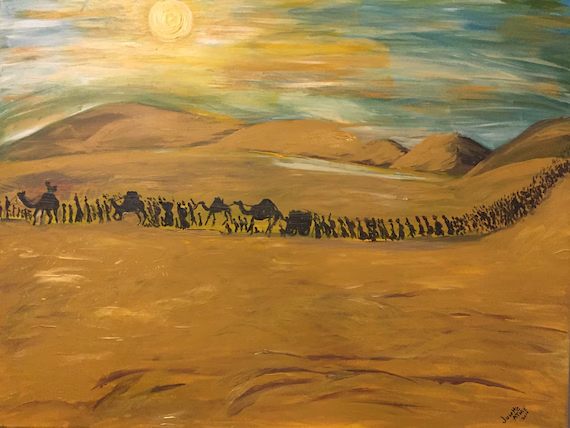Moses in the Bulrushes
Many years passed, and Jacob's descendants, who were known as the Hebrews, grew into a large and powerful nation.
Joseph lived to be a very old man. But, after he died a new, cruel Pharaoh ruled Egypt. He was afraid that the Hebrews would join forces with Egypt's enemies and take over the country, so he made them his slaves.
He forced them to work on the land and to build great cities and temples. All day they toiled, making bricks of mud and straw which were baked hard in the hot sun. Guards with whips watched them and beat them if they stopped or tried to rest.
Although they were now slaves, the Pharaoh was still frightened of the Hebrews. He made a new law and ordered his soldiers to kill all the Hebrew baby boys as soon as they were born.
One Hebrew mother managed to hide her new baby son. Moses, in her house for three months. As he grew older, she was afraid the soldiers would hear him crying and would find him, and kill him.
So she decided she could keep him no longer. One day, she picked up Moses and hurried secretly down to the river bank. There she made a basket out of reeds, covering the outside with clay and tar to make it waterproof.
When it was finished. she laid the sleeping Moses in it. Then she put the basket gently down on the water among the bulrushes and pushed it out on ther great Nile river.
Her young daughter Miriam, was hiding in the reeds. She watched the basket float away down the river and followed it, walking along the river bank to see where it would go.
Soon, the Pharaoh's daughter and her maids came down to bathe in the river. The Princess noticed the basket floating among the reeds, and ordered one of her maids to bring it to her.
When the Princess looked at the sleeping baby, she said; 'This must be a Hebrew boy. At that moment Moses woke up and cried. The Princess felt so sorry for the tiny baby, she decided to keep him.
Miriam was watching from among the reeds and she heard what the Princess said. She ran to her and bowed very low.
'Do you want a Hebrew nurse to take care of the baby?she asked. 'Yes. bring one to me, ordered the Princess.
Miriam ran to her mother and told her what had happened. Together they hurried back to the Princess. 'Take care of this baby for me. I 'll pay you well, said the Princess.
The mother was delighted to be able to take her baby son home, knowing that now he was safe. Moses lived with his mother and the rest of his family until he was old enough to go back to the Princess.
Then his mother took him to the Palace. 'He is my son now, said the Princess and his mother left Moses to be brought up as an Egyptian prince.













Comments
Post a Comment